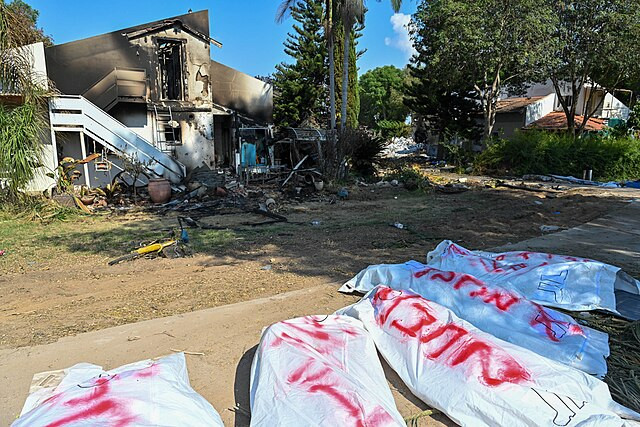United Nations human rights chief Volker Türk has expressed his horror at reports of mass graves containing hundreds of bodies at two of Gaza's largest hospitals. Palestinian civil defense teams began exhuming bodies from a mass grave outside the Nasser hospital complex in Khan Younis last week, after Israeli troops withdrew from the area. A total of 310 bodies have been found in the last week, including 35 in the past day, according to Palestinian officials.
"We feel the need to raise the alarm because clearly there have been multiple bodies discovered," said Ravina Shamdasani, spokesperson for the UN high commissioner for human rights. She described bodies "buried deep in the ground and covered with waste," adding that "among the deceased were allegedly older people, women and wounded," including some bound and stripped of their clothes.
The discovery of the mass graves has prompted the U.S. to inquire about the reports with the Israeli government. State Department spokesperson Matthew Miller confirmed that the U.S. is pressing the Israelis to find out more about the issue. "I've seen those reports and we are inquiring about it with the government of Israel," Miller said during a news briefing on Monday.
Israel's military has rejected allegations of mass burials at the hospital, stating that it had exhumed corpses to try to find hostages taken by Hamas in October. "The claim that the IDF (Israel Defense Forces) buried Palestinian bodies is baseless and unfounded," the military said, adding that after examining the bodies, its forces had returned them to where they had previously been buried.
PALESTINIANS RECOVER 180 BODIES FROM KHAN YOUNIS MASS GRAVE
The mass grave was inside the Nasser Medical Complex in Gaza’s Khan Younis two weeks after Israeli forces withdrew from the area.
Source: Al Jazeera | Video: Eye of Palestine pic.twitter.com/PILtiIP3Mg — Mario Nawfal (@MarioNawfal) April 22, 2024
The discovery of the mass graves comes amid an ongoing conflict that has left Gaza in a dire humanitarian crisis. Israeli airstrikes have pummelled northern, central, and southern Gaza in recent days, including naval artillery fire that has struck buildings along Gaza's eastern shoreline. Many areas already reduced to little more than rubble and broken slabs of concrete after 200 days of war have been hit, including Beit Lahia in the north and the centre of Gaza City. "The north remains dire," said Olga Cherevko of the UN's office for coordination of humanitarian affairs, speaking during a visit to the area. "There's more food coming in, but there's no money to buy it. Healthcare facilities destroyed. There's no fuel to run water wells, and sanitation is a massive issue. There's sewage everywhere." As Israeli ground troops reportedly staged a brief incursion into eastern Khan Younis, in the south of Gaza, satellite images from the destroyed city showed a growing tent encampment, which could be intended to house people fleeing Rafah in the event of an Israeli ground attack there. Israeli Prime Minister Benjamin Netanyahu has repeatedly threatened to attack Rafah, Gaza's southernmost city, where more than a million people are sheltering. UN rights chief Türk has warned against a full-scale incursion on Rafah, saying it could lead to "further atrocity crimes." Melanie Ward, the head of Medical Aid for Palestinians, who has recently returned from a visit to Gaza, said an Israeli invasion would be impossible without "human slaughter." Many of the recent strikes have hit parts of Gaza where people already displaced have fled for the third, fourth, or even fifth time. "There's no safe place to escape to, so everything we do, we try to do it fast," said Rama Abu Amra, a 21-year-old student who sleeps with her family in a tent outside a friend's house in Deir al-Balah, their fourth location since fleeing Gaza City months ago.
Wow, StateSpox won’t say if the US would support an independent investigation for another mass grave found in Gaza.@SMArikat: More than 300 bodies have been found, UN is calling for an independent investigation, would you support that? Patel: We are asking Israel for more info pic.twitter.com/sBwGlDh79s — Assal Rad (@AssalRad) April 23, 2024
The war that started after Hamas militants attacked southern Israel on October 7, killing at least 1,200 people and taking 253 people hostage, has so far killed at least 34,183 people in the Gaza Strip, according to the Hamas-controlled health ministry in the territory, cited by Reuters on Tuesday. The support for Israel's response shown by President Joe Biden has sparked student protests across the U.S. and divided Democrats.
Jan Egeland, secretary general of Norwegian Refugee Council, said that the humanitarian situation had "reached catastrophic levels with nearly the entire population forcibly displaced and facing dire shortages of essential goods and services," in a media statement to Newsweek this month. As the conflict continues, the international community is calling for an end to the violence and for the protection of civilians caught in the crossfire.






